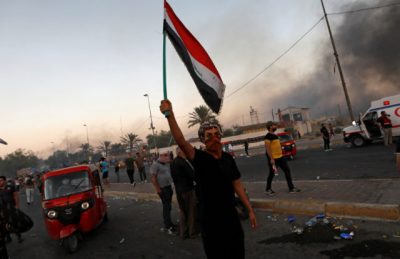Iraq Protests Could Help Check Iranian Influence
Terrorism Monitor
By: Brian M. Perkins
The Jamestown Foundation

Anti-government demonstrations taking place in Iraq pose a new, precarious challenge for both the United States and Iran as the two countries continue to vie for influence in the region. Tensions between Washington and Tehran remain high after Iran was blamed for the large-scale attack on key oil infrastructure in Saudi Arabia. The protests began on October 1 and have been led by the country’s Shia community, which has grown increasingly disenfranchised by corruption and a lack of public services and employment opportunities. The protestors’ demands grew increasingly political, however, as security forces violently cracked down on the demonstrations, leaving more than 100 dead (Rudaw, October 20).
Anti-government sentiment has been building over the past year as the government has made little headway in rooting out corruption and the economy continues to stagnate. While the protests are on hold until October 25 for the Shia religious observance of Arba’een, if Abdul-Mahdi’s government does not offer significant concessions and the results of the inquiry into the protestors’ deaths is unsatisfactory, the demonstrations are likely to escalate and pose an existential threat to the viability of the current government. Muqtada al-Sadr, the popular Shia cleric and head of the Sairoon Alliance—the largest parliamentary bloc—has also publicly called for demonstrations to continue and withdrawn his support for the Adil Abdul-Mahdi-led government (Rudaw, October 20).
In addition to posing a significant threat to the Iraqi government, the protests also pose a notable challenge to Iranian influence in Iraq, particularly due to the alleged involvement of Iranian-backed militias belonging to the Popular Mobilization Forces (PMF) in the crackdown and death of numerous protesters. Reports emerged that Iranian-backed militias deployed snipers to the protests. Although the faction of the PMF responsible has not been independently confirmed, reports indicated that Abu Zainab al-Lami—the pro-Iran and Kata’ib Hezbollah-linked Head of Security for the PMF—directed the snipers (Alaraby, October 17). Frustration with these militias and mistrust of Iran has been bubbling to the surface for the past year and this incident only creates further animosity. Protesters have actively denounced foreign interference, particularly by Iran, and are likely to make a push for the government to rein in the PMF and its pro-Iran factions.
The protests and deepening mistrust of Iran and its allied PMF factions, meanwhile, provides a window of opportunity for the United States, which is seeking to check growing Iranian influence in Iraq. However, the situation is exceptionally precarious and the U.S. response cannot be seen as overly meddling in the process as it would only serve to drive a larger wedge between Baghdad and Washington. The coming weeks will be critical for the Iraqi government, the United States, and Iran. Missteps by any side will undoubtedly have significant implications, particularly if the current Iraqi administration falls.
The Jamestown Foundation kindly allows Modern Tokyo Times to publish their highly esteemed articles. Please follow and check The Jamestown Foundation website at http://www.jamestown.org
https://twitter.com/JamestownTweets The Jamestown Foundation
https://jamestown.org/program/briefs-315/
Photo source: The photo in this article is the original image uploaded by The Jamestown Foundation (source: middleeasteye.net)